
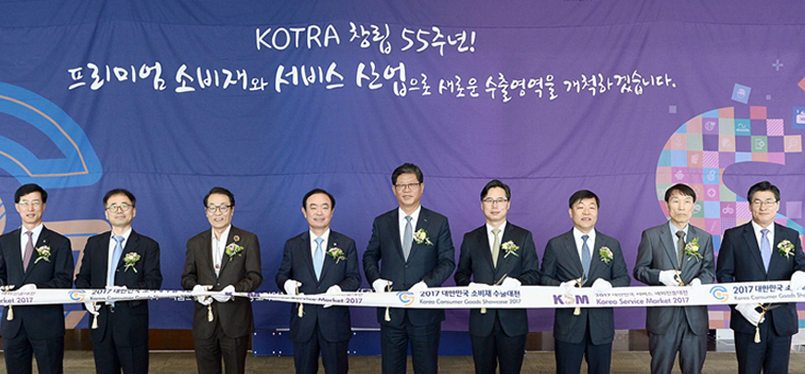
Promising Korean venture companies and
SMEs showcased a variety of products at
the event but all had one thing in common: good ideas
The 2017 Korea Consumer
Goods Showcase, hosted by
the Ministry of Trade,
Industry and Energy (MOTIE)
and organized by KOTRA, provided
global business leaders and Korean
companies the chance to explore part-
nership opportunities in the consumer
goods industry. Held in Seoul from
June 15 to 16, 1,300 Korean enterprises
specializing in convergence goods,
fashion apparel, food, health, beauty and
baby products attended the event to meet
with potential foreign buyers. The event
was comprised of two main programs: the
K-Consumer Goods Exhibition and one-
on-one business meetings.
A total of 1,300 Korean suppliers held
business meetings with 330 foreign buy-
ers from 41 countries. 11 global retailers
and their 56 vendors were also invited to
provide consultation for Korean firms
hoping to sell their products to global
retailers and promote sales. “We’re excit-
ed to have this opportunity to meet inno-
vative Korean companies,” said a repre-
sentative at Tchibo, a German chain of
coffee retailers and coffee shops.
“KOTRA has done an outstanding
job promoting Korea overseas so we look
forward to working with the agency to
meet Korean partners.”
The most popular exhibition in the
showcase was the convergence consumer
goods pavilion. Korean companies in this pavilion pushed
the boundaries of smart
wearables, displaying smart belts and
smart shoes at the exhibition. A sales
staff at Welt, a Korean startup and winner of the
trade ministry’s most innovative award, pointed
to a black leather belt.
“Welt keeps track of your waist size and
records how active, or inactive, you’ve
been throughout the day. It also keeps
your pants up, of course.”
Another company under the spotlight was
Salted Venture, a spin-off startup from
Samsung Electronics. Hailed as the
world’s most advanced smart shoes,
Salted Venture’s IOFIT, tracks the
weight transfer and balance in your golf
swing. The pressure sensors insides the
insoles send information to your phone,
allowing you to check your foot pressure
data; the app even offers suggestions to improve your stance.
But it wasn’t only the latest IoT tech-
nologies that were turning heads at
the
Korea Consumer Goods Showcase.
Large crowds gathered at the Art
Collaboration Exhibition, which provided
small and medium enterprises (SMEs)
the opportunity to work with Korea’s
renewed artists to design their products.
All products from the exhibition will be
featured in various overseas marketing
events to promote the export of SMEs.
Held on the sidelines of the event was a
seminar on the latest trends in China’s
consumer goods export market. The sem-
inar invited experts well-versed in
China’s changing consumer market and
provided practical strategies to Korean
companies interested in entering the
China. One such expert was Kichan Jeon of the Korea Agro-Fisheries & Food
Trade Corporation. “China’s agro-food
market takes up a whopping 17 percent
of the entire world agro-food market
share,” said Jeon. “As such,
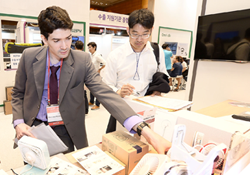
Korea’s
export volume to China has grown signif-
icantly; last year Korea exported USD
1.47 billion worth of agro-food products
to China.” According to Jeon, Korean
products that are seeing constant demand
by Chinese consumers include yuzu tea, dried seaweed and baby formulas.
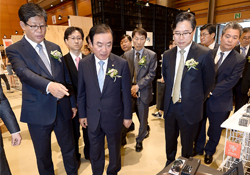
KOTRA President and CEO Jaehong
Kim noted that consumer goods are
becoming more important than ever,
as
they continue to record stable export
growth. Kim added that events like this
can diversify risks in Korea’s current
export structure which is mainly driven
by intermediate and
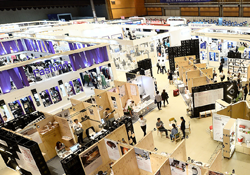
industrial goods. By creating more jobs than the traditional manufacturing sector, these industries will no doubt serve as the driving force in Korea’s exports.
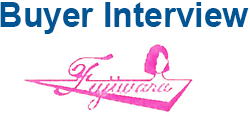
On the occasion of the 2017 Korea Consumer Goods Showcase,
KOTRA Express sat down with one foreign
buyer,
Mr. Hidemi Mizuno of Fujiwara Co., Ltd.
Here’s what he had to say about the event.
We are a Japanese textile company based in Osaka. We import textiles and sell them to companies all over the world. Most of our products are sold to compa- nies in Korea, Southeast Asia and the Philippines. We also have a Korean office located in Gangnam-gu, Seoul.
Yes, we are currently working with BYC, a Korean clothing manufacturer that exports apparel to the United States, Canada, Japan, Europe and the Asia- Pacific region. We have been close part- ners of BYC for 35 years. We first worked with BYC because they were looking for special textiles like breathable fabrics. We also work with
five or six other
smaller Korean companies.
Although Korea’s cost of labor is rela- tively higher than other countries, the country’s knowhow and expertise in the field of textiles and apparels are superior. So we’d like to find innovative Korean companies that boast advanced skills. In particular, we’re looking for Korean com- panies that have factories overseas.
We have participated in number of one- on-one business matching events organ- ized by KOTRA and we’ve been able to find great companies. But I do
hope that the agency can provide information for
potential Korean partners beforehand so
that we can meet partners that are most
suitable for us.